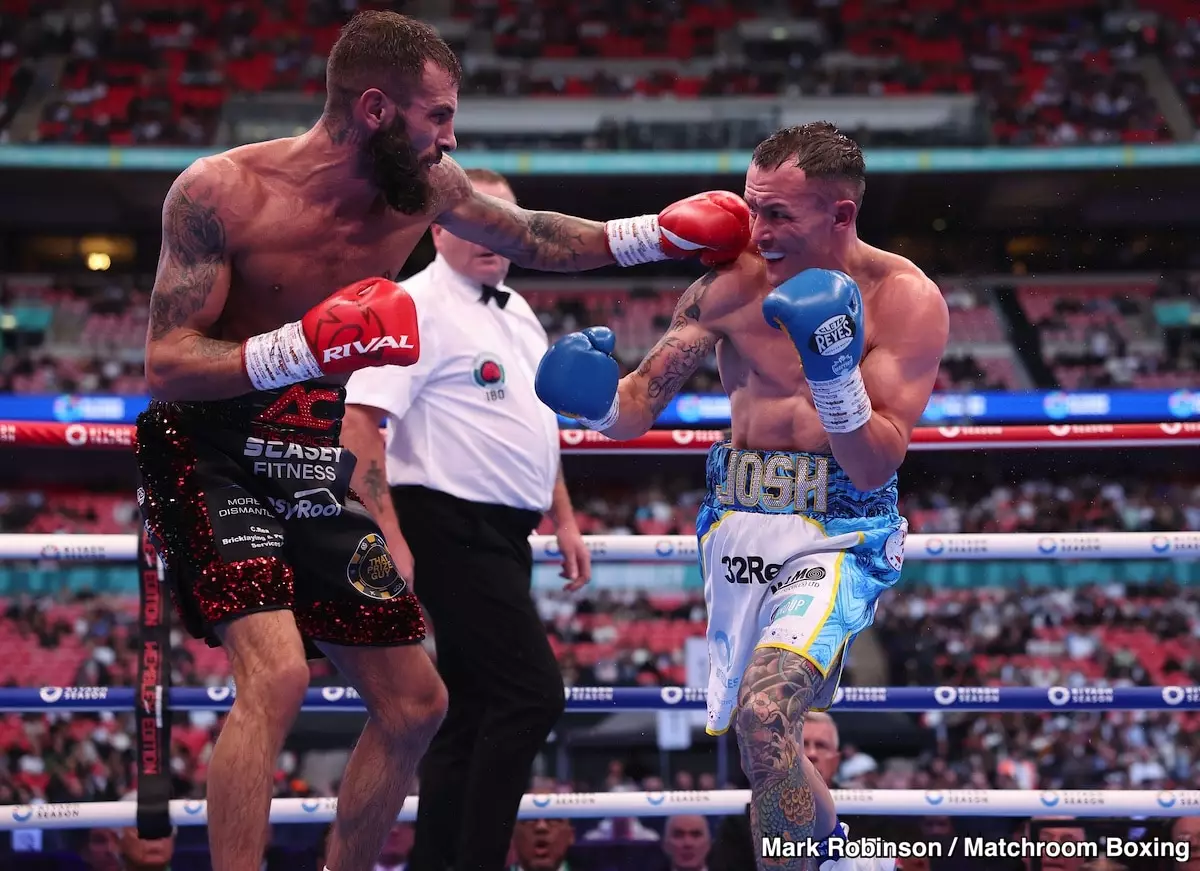After a successful title defense against Josh Warrington last weekend at Wembley Stadium, Anthony Cacace sets his sights on the lightweight division, eyeing formidable opponents like Vasily Lomachenko and Gervonta ‘Tank’ Davis. At 35 years old, Cacace stands at a significant crossroads in his boxing career. The decision to move up from super featherweight (130 lbs) to lightweight (135 lbs) is overshadowed by the undeniable allure of potential greater financial rewards. With a professional record of 23 wins and just one loss, Cacace is eager to capitalize on the opportunity before him, refined by a newfound confidence after defending his IBO title.
Cacace’s consideration to ascend to lightweight stems not only from the potential financial windfall but also from the competitive landscape of boxing. Engaging in bouts against champions like Davis or Lomachenko offers a vastly more lucrative payday than what he would encounter fighting the likes of Eduardo ‘Sugar’ Nunez, who poses a real threat in the current super featherweight landscape. Despite the risks, the prospect of fighting elite opponents could also serve as a significant boost to Cacace’s profile and legacy in the sport.
Cacace’s recent bout against Warrington showcased both his strengths and areas for improvement. The 12-round fight ended decisively in Cacace’s favor, evidenced by the judges’ scores of 117-111, 118-110, and 117-111. Despite this, Cacace was far from thrilled with his performance. He acknowledged that he fell short of his potential, crediting his opponent’s seasoned tactics that effectively neutralized his range and power. Warrington’s strategy involved crowding Cacace, employing close-quarters combat, and executing clinches, which limited Cacace’s opportunities to dictate the pace and distance as he normally would.
From a critical standpoint, Cacace’s performance raises questions about his ability to adapt against skilled opponents. Not only did he underestimate Warrington’s experiences, but his execution revealed a fragility in maintaining distance—a crucial aspect he would need to master greatly if he steps into the ring with the heavy-hitters at lightweight.
Should Anthony Cacace decide to make the leap to the lightweight division, the stakes will rise dramatically. The skill and power of opponents like Tank Davis will require Cacace to employ a more strategic fighting style that emphasizes his reach and technique. It’s understood that Davis’s management is notoriously selective in match-up choices, often opting for less risky pursuers to maintain their boxer’s appeal. This makes the prospect of a Davis-Cacace match complicated but tantalizing for fight fans and Cacace’s ambitions alike.
Moreover, when discussing the possibility of facing Lomachenko, Cacace needs to confront the reality that while he may hold the mandatory challenger position, gaining clearance for such a bout is far more complicated in practice than in theory. As he works to position himself atop the lightweight hierarchy, Cacace must enhance his strategic acumen to effectively engage with these champions who exhibit diverse styles, speed, and experience.
Despite his recent victory, Cacace’s contemplation of future fights is far from a straightforward path. He possesses a wealth of knowledge and experience, having already bested two world champions. Yet, the truths behind boxing lay bare that each new opponent presents unique challenges that require a tailored approach. The frustrations expressed by his corner during the Warrington fight hint at the potential difficulties he will face if he doesn’t adjust his fighting style moving forward.
The imminent decision for Cacace rests upon his ability to absorb the lessons from his past fights and implement those learnings into a more dynamic strategy that suits the lightweight division. The importance of psychological fortitude and adaptability cannot be overstated; they are essential traits that can make or break a boxer’s career when stepping into the ring with relentless competition.
As he considers moving up to lightweight, Anthony Cacace should seek to refine his skills and fight smarter rather than focus solely on seeking out the richest paychecks. The blend of long-term vision and immediate action will determine the success of his prospective career transition and pacing him as he navigates the uncertain waters of elite boxing.

